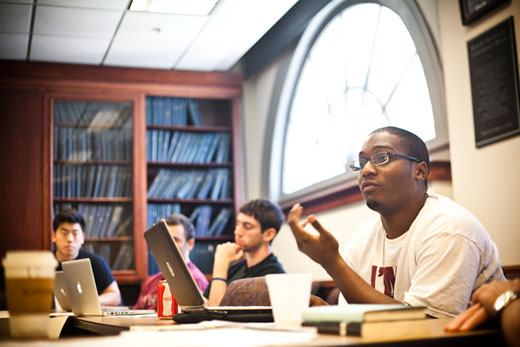If Marshall Duke ever wondered if there was a need for Emory to offer its first Maymester program, all he has to do is look around his own classroom this month to find the answer.
What he sees: Students anxious to earn college credits and still have summer opportunities before them — from internships and employment to travel abroad programs — as well as a few seniors who are only one class shy of graduating, but already have jobs awaiting them.
"It's a beneficial thing, all the way around," says Duke, who has seen a dozen students enroll in his Maymester psychology class on "Personality and Creativity," among four courses offered during the three-week break between Emory's Commencement and the beginning of summer school.
This marks the inaugural year for Emory's Maymester, an intense, shortened academic term that has become increasingly popular across U.S. college campuses for students interested in earning class credits in a compressed period of time.
At Emory, the time was simply right to offer Maymester classes, says Mollie Korski, associate director of summer programs for the Office of International and Summer Programs. Maymester, which runs from May 15 to June 1, has drawn an initial enrollment of about 50 students.
The format is focused — classes run 3.5 hours daily, meeting Monday through Friday. Emory College and visiting undergraduate students are permitted to take only one Maymester class at a time; students earn four credit hours per course.
Helping students meet their goals
Not only does Maymester help students achieve their academic goals, the program better utilizes campus facilities during summer months and responds to a University-wide challenge to find creative new sources of revenue, Korski says.
The decision to offer Maymester grew out of a conversation within Emory College of Arts and Sciences about how to generate additional revenue to support the college's mission, says Dean Robin Forman.
"Students have an opportunity to fulfill GERs (general education requirements), can earn college credit and have the rest of the summer to pursue research, internships, travel abroad, employment or leisure time — that's really been appealing," Korski says.
In selecting this year's class offerings, her office turned to Emory faculty to suggest proposed courses, she adds.
"I think we'll learn a lot this year, both from students and faculty," she says. "We've already seen that courses that fulfill undergraduate writing and GER requirements are popular. I also expect that other faculty will come forward with ideas and expand course offerings with unique opportunities next year — there is a lot of creative energy out there."
For Hazel Doctor, a rising junior in neuroscience and behavioral biology, the chance to take Duke's "Personality and Creativity" class couldn't have come at a better time.
By mid-June, she plans to be working in a laboratory on the West Coast. That left her with a little time to fill.
"Once finals were over and summer was about to begin, I wanted to try something totally different, and this really caught my eye," Doctor explains. "Not only was it fitting with my time, I thought it was a great opportunity to try something fun."
She has not been disappointed.
Though the intensity of a compressed course is understandably higher — with substantial requirements for daily readings, writings and presentations — Doctor has enjoyed being able to focus on just one class.
Creative opportunities for students, faculty
The compressed Maymester term has also presented creative opportunities for Emory faculty, says Korski.
In a class on "International Shakespeare in a New Media World," Emory English Professor Sheila Cavanaugh co-teaches via videoconferencing with Kevin Quarmby, Distinguished Visiting Scholar with the Halle Institute for Global Learning — who is in London — while linking electronically with faculty and students in India.
In the "Ethics of Leadership" class, co-taught by Peter Wakefield, senior lecturer and director of undergraduate studies at Emory's Graduate Institute of the Liberal Arts (ILA), and Kevin Corrigan, Samuel Candler Dobbs Professor of Interdisciplinary Humanities and director of the ILA, the three-week format is being used to introduce students to influential leaders from Atlanta and beyond. Recent classes found students on field trips to The Carter Center and the Atlanta History Center.
Duke acknowledges there is a challenge in adjusting courses to different time frames: "The intensity is very high — there are only 21 hours between classes — but I've found the students to be very responsive."
"I'm also finding that it's easier to maintain and make connections among topics that come up — things pull together more easily because they don't have time to fly apart," he adds. "It requires an adjustment on my part to decide what is really important about a subject. What do I include? What do I leave out? Will I achieve the same impact?
"As educators, it requires us to rethink things, and I like that challenge," he adds.

